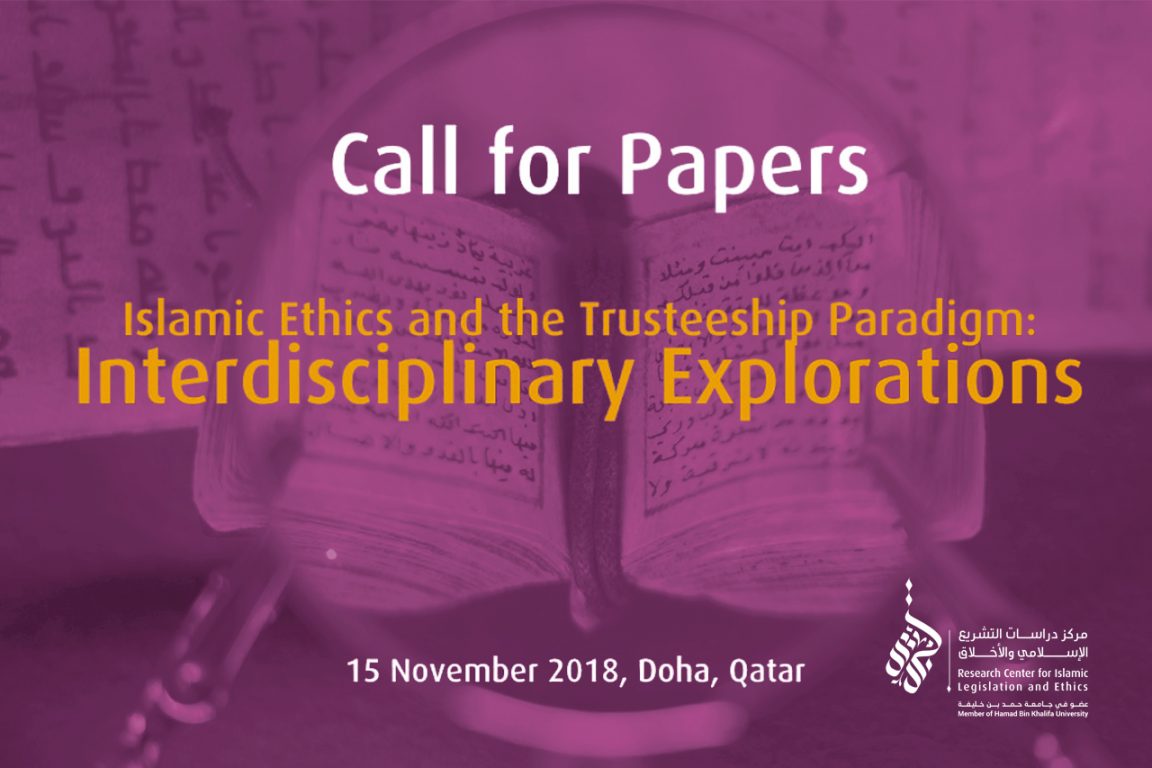Islamic Ethics and the Trusteeship Paradigm

About The Event
Islamic Ethics and the Trusteeship Paradigm: Interdisciplinary Explorations
Call for Papers
Abstract Submission Deadline: February 5, 2018
The question of ethics (al-akhlāq (pl.) in Arabic) in the field of Islamic Studies is nascent. The dominance of the study of jurisprudence and law in approaching Islam and Sharia has eclipsed the message of ethics in the whole tradition. The study of the formative period of Islamic scholarship in general hardly examines ethics as an independent branch of scholarship; ethics hardly appear as an explored discipline or theme in the exegeses of the Quran, the science of the hadith, the study of legal theories and schools, kalam theology, philosophy, and mysticism; it often appears within these major fields of scholarship on the margin.
The Journal of Islamic Ethics (JIE)- sponsored by the Research Center of Islamic Legislation and Ethics (CILE) in Doha (Qatar), which is affiliated to the Faculty of Islamic Studies, Hamad Bin Khalifa University, and published by Brill – launches a Call for Papers that takes the under-researched Trusteeship Paradigm as a background to revisit the question of ethics in Islamic thought. Three major lines of work will be addressed:
1) the link Trusteeship Paradigm builds with classical Islamic scholarship;
2) the engagement of Trusteeship Paradigm with contemporary Islamic scholarship;
3) Trusteeship Paradigm’s engagement with and critique of Euro-American modernity, its ethical theories, and Trusteeship permeation and application to various sciences.
This Call for Paper-Seminar invites scholars and academics expert in or familiar with the arguments of Trusteeship Paradigm of ethics to submit a paper in which they critically deal with how one of the below outlined topics is examined by this paradigm, and how it differs, or not, from the way it has been studied by other Islamic and non-Islamic theories of ethics. The questions corresponding to each topic are not exclusive:
- Ethics and/in the Quran and Sunna: how different is ethics in TP from classical exegeses and hadith scholarship? Were classical interpretations of the Quran and Sunna not ethical enough? Or, ethics are contextual and have to adapt to the modern context?
- Classical Sharia Rights Preservation and the Place of Ethics: how does TP re-interpret and re-arrange the order of sharia classical five/six rights (al-kulliyat al-khams)? How does TP critique of modern interpretations of sharia differ from other Islamic modern theories?
- Kalam theology and philosophical ethics: how is TP different from classical kalam theology and classical philosophical theories of ethics? How is reason in TP different from its counterpart in classical kalam theology?
- Islamic legal theories and the non-/centrality of ethics: how tenable and factual is the claim of TP that Islamic legal theories centralized law (“fiqh”) instead of ethics?
- Religion, ethics and politics: how does TP propose to contribute to politics in Muslim majority societies while centralizing ethics? Are these ethics public or private, or both? What is the dividing line between the two spheres (private and public) in politics? How does TP critiques secular and religious extremisms?…
Authors of a limited number of accepted leading papers will be invited to participate in a seminar on the topic under study. Their accommodation and travel expenses will be covered by CILE. The seminar papers as well as the rest of accepted papers will be published as a thematic in the peer-reviewed Journal of Islamic Ethics or as an edited volume in the book-series Studies in Islamic Ethics (Brill).
Source: Research Center for Islamic Legislation and Ethics (CILE)
Location
Islamic Ethics and the Trusteeship Paradigm: Interdisciplinary Explorations


We're always eager to hear from you.
If you’d like to learn more about us or have a general comments and suggestions about the site, email us at